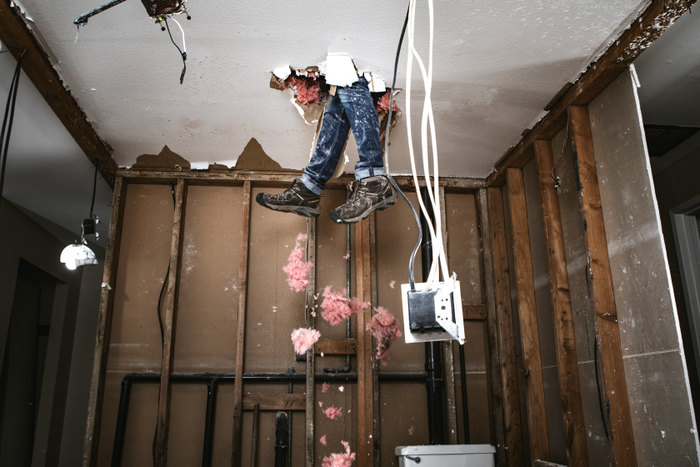Questions to consider before starting a home project
The finish line is often the first thing we think of when considering home improvement projects. Preparing meals after a kitchen remodel, relaxing on a new deck that elevates your outdoor space, logging in from a renovated home office – it can be tempting to fast forward to the end result, so try not to get ahead of yourself.
Long before a hammer connects with any nails, there are plenty of things you should think about to prepare for your home improvement project. Your finances need to be in order, your timing needs to be right, and your contractor needs to be trustworthy. Before your home improvement project begins, consider your answers to these questions.
1. What are your objectives?
Let’s talk big picture: What are you really hoping to achieve with this project? Maybe you’re simply updating a part of your home so you can enjoy it for as long as you choose to live there. For some homeowners, though, every home improvement project is a way to boost their home’s resale value. Is that the case for you?
Setting the goals of your home improvement project before its first phase provides an important perspective that influences the entirety of your approach. Decisions related to timelines, budget sizes, and contractors performing the work should all be impacted by your desired final outcome. For example, because you know your objectives, you’ll be able to communicate your expectations more clearly with a potential contractor to help determine if they’re the right fit for your job.
Related Article: Having trouble finding a qualified contractor? Try these tips
2. What are your projected costs?
Now that you know your goals, it’s time to research the choices available for this project. Is the style you initially envisioned the best one to pursue? And what about materials, is anything especially hard to source right now? Are some materials significantly more expensive?
Conversations with contractors can help you fill in these important blanks. Contractors regularly work with the types of materials you’ll need, and they own a unique, firsthand perspective on any styles you’re considering. You can lean on their expertise to find out what labor could cost, too.
Those conversations could also inform your decision to set aside money for an emergency budget. Unforeseen circumstances like wiring issues, asbestos detection, or pest removal can be an unfortunate part of the home improvement experience, especially if your home is older. Doing your homework before you begin your home project is key to making informed decisions and bypassing any surprise expenses.
Related article: See BBB's tips to create a budget and stick to it.
3. What is your expected return on investment (ROI)?
Since we’re already talking about costs, it’s worth determining whether the amount you’re putting into any home improvement project is reasonable compared to the expected increase in your home’s value.
You can find the expected increase in your home value online or by connecting directly with a real estate agent or appraiser. Assess that against the estimated total cost of your project (from your research) to determine your ROI. Generally, a minimum 80% ROI is a good target.
4. What are your future needs?

An important element in turning a dream home improvement project into an actual, this-is-really-happening home improvement project can be a heavy dose of practical thinking. As fun as that doesn’t sound, it is important to add some enduring, long-lasting relevance to your home improvement or home renovation project.
Are you a new homeowner who expects to grow your family soon? Do you plan to spend your retirement years in your current home? Answers to those questions could, and likely should, alter your home improvement project plans. Needs change over time, so don’t force yourself to undo a home improvement project because of a life update you may have on your docket.
5. What is the best value?
Plenty of considerations will play into your contractor decision; cost is very likely going to be one you weigh most heavily. Finding the best value is an important part of shopping. For your home improvement project, getting quotes from contractors is an essential way to find that value.
It’s best practice to collect multiple quotes – at least three – from general contractors for your specific project; it's a good idea to do this before hiring a contractor. Having several quotes to compare makes it easier to identify what a fair price looks like for the work you’re requesting and positions you to sidestep expensive, stressful and time-eating issues once the project gets underway. A review of quotes can also be a way to spot opportunities for saving money.
6. What permits will you need?
Depending on your home improvement project's size, scope, and location, permits may need to be obtained before any work can be performed. Common home improvement projects that could require permits include:
- Changes made to the structural support of your home (removing load-bearing walls or adding a new room).
- Adding or altering electrical circuits, upgrading electrical service, or installing new electrical fixtures.
- Modifying plumbing systems (adding new pipes, relocating fixtures, or installing a new water heater).
- Performing HVAC work, such as installing new heating, ventilation, or air conditioning systems.
- Replacing or repairing your roof.
- Installing new windows or doors may require a permit, especially if they alter the structural integrity of your home.
Any quest to find the types of permits you’ll need before starting your home improvement project must begin at your local building department or permitting office. Connecting with a trustworthy contractor who’s up to date on code can also guide you through the permitting process.
7. What will you need to communicate?
Home improvement projects, especially large ones, can invade every area of your daily life. A kitchen renovation, for example, consumes more than just your kitchen when the project gets underway. Crews will be coming in and out of the house, and their work will often be loud.
Partners, kids, pets, and if you’re a remote employee, even coworkers, can each feel the disruption that arises from a home improvement project. So, think of all the information you may need to share ahead of time to cut down on the chaos. Timelines, work schedules, living arrangement adjustments, and potential safety concerns should be some of the items you need to anticipate communicating.
8. What contractor will you choose?
So far, every question you’ve considered hinges on your approach to answering this one. You’ll be relying on your contractor to help you stay within your budget, secure any necessary permits, communicate updated timelines and troubleshoot issues to reach the finish line of your home improvement project with your dream result realized.
So while you may not know right now which contractor you’ll choose to take on your project, you should consider the qualities you want that company or individual to possess:
- Do they get rave reviews from previous customers?
- Have they been responsive to any complaints they’ve received?
- Are they current on all their contractor licenses?
- Most importantly, is the contractor trustworthy?



